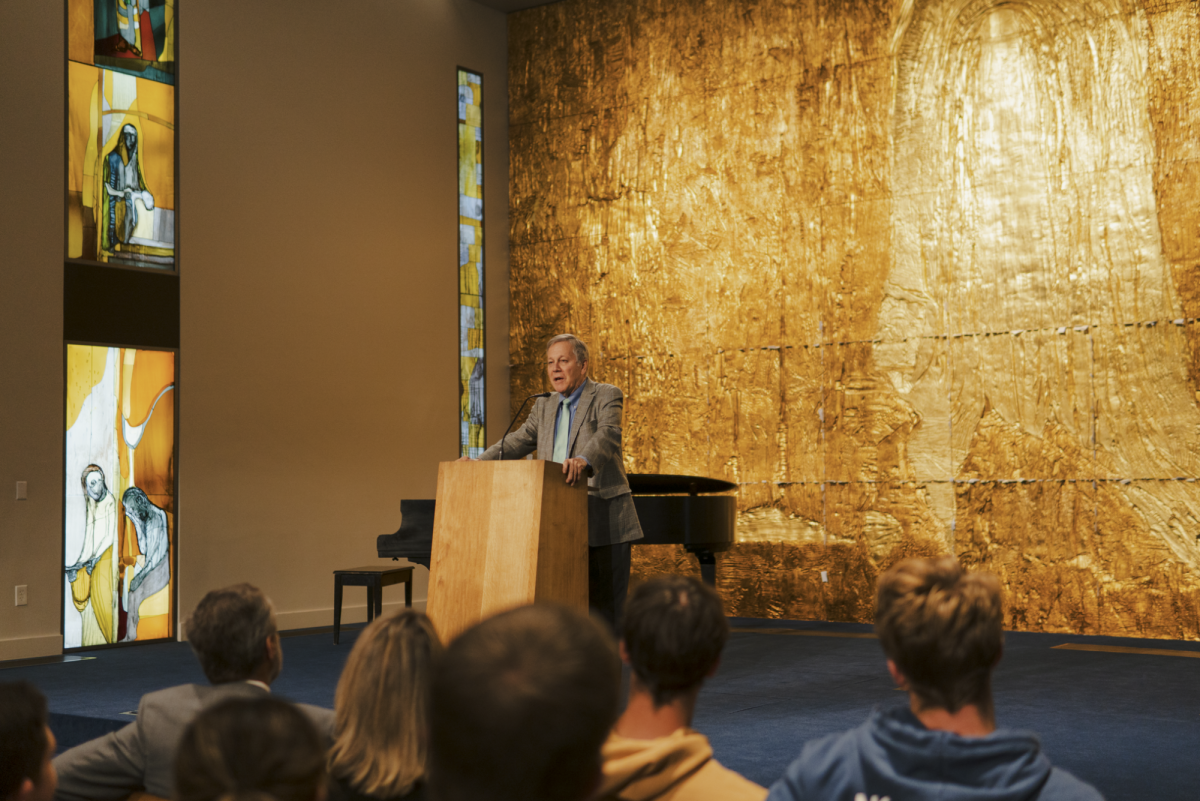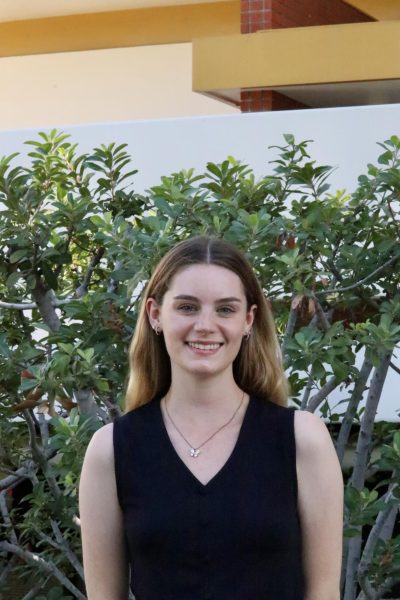The heart of poet Dana Gioia’s work is being able to capture the beauty of God’s creation: “What beauty does is beauty draws us to the infinite number of perfections of creation. It calls forth things in ourselves. The same way it did to me as a kid not knowing this – it calls forth to us to achieve our personal and spiritual capacity,” Gioia said on Wednesday night.
On November 13th, Dana Gioia came to Biola to give a lecture on “Why Beauty Matters,” featuring personal reflection, poetry reading and a Q-and-A with students.
Dana Gioia is the former California State Poet Laureate, chairman of the National Endowment for the Arts (NEA), a Stanford and Harvard graduate and a critically acclaimed poet and author. His works include full-length poetry collections, critical essays and opera libretti. His literary expertise, coupled with his talent for incorporating Christianity and passion into what he does, allowed him to give a thought-provoking lecture.
A CULTURALLY RICH CHILDHOOD
Dana Gioia began his lecture by detailing his past, speaking about how he was raised in a working-class family in Hawthorne, California. The son of a Mexican-American mother and Sicilian father gave him a rich understanding of various languages and cultures. Despite his family not being educated, he noticed their endearment for poetry and beauty at a young age.
“My mother would just turn to me while doing dishes, and she would recite a poem,” Gioia said. “These things were very precious to my mother. I didn’t really understand why until I was much, much older. I didn’t fully understand why until after she had died. But, you know, being raised in poverty, having lost her mother at an early age — being in a family that didn’t even always put food on the table — these were things of beauty that she possessed.”
Gioia discussed how poetry is the most ancient form of art known to man, capable of articulating emotions and images that are bewitching to be encapsulated by anything else.
In quoting “As You Like It” by William Shakespeare, Gioia said: “‘Sweet are the uses of adversity, which like a toad, ugly and venomous, wears yet a precious jewel in his head. And this, our life, exempt from public haunt, finds tongues in trees, books in running brooks, sermons in stone. And good in everything’. Now, I had no idea what that meant when I heard it, but once again it brought me into these woods, these hard, cold, dangerous woods, and realizing that it was a blessing.”
Gioia encourages believers to reclaim the notion of beauty and how we can look for it in everyday life and appreciate it to its fullest extent, without discarding it as something not of importance.
“And then it ends with this vision, because it talks about the reason we’re so cold and we’re hungry, and it’s dangerous because of Adam. You know, Adam. His sin created all this, and yet, here we are. We take ourselves away from the comforts of the court, of the distractions of politics, and we find books in running brooks, sermons in stones, and good in everything,” Gioia said. “I was always aware that beauty was taking me somewhere. This is an experience, and I couldn’t put it into words.”
RECONCILING A CAREER AND A LOVE FOR THE ARTS
Gioia found ways to reconcile his professional life as a businessman with his love for the arts, having studied literature, taught poetry and been a student of music in Vienna.
“I was forced to work for a living, and so I had to figure out how to do this [be a poet]. I first thought, well, if I’m going to be a poet, what am I going to be? Maybe a professor. That’s what poets do. And so I went to Stanford. I went to Harvard Graduate School,” said Gioia.
Gioia noted that both poetry and the notion of beauty seemed to be abandoned by the literature departments at these institutions. “Beauty” was something avoided at all costs, as it was often associated with sentimental or non-serious works.
Gioia continued both his professional and artistic endeavors by attending Stanford Business School while still writing poetry. For nearly fifteen years, he worked ten-hour days while still setting aside ninety minutes every evening for his poetry writing. Despite this, Gioia still longed to be able to incorporate his religion into his work, which was difficult to do amongst a secular population.
“I was, in a sense, being educated about … this central spiritual discipline of mankind with no acknowledgment of the divine. And so I began thinking through these things,” Gioia said. “And what I realized was that beauty is not a thing. Beauty is not a set of artistic principles of anything else. It is an experience. It’s a kind of experience that is not mundane or ordinary.”
HOW CAN WE APPRECIATE BEAUTY?
Gioia described how one can become fully appreciative of beauty. He believes that one must first observe something beautiful, find pleasure in it and allow themselves to be fully encapsulated by it. The last stage, he said, is acknowledging the temporary quality of beauty — that it is something outside of oneself, something that cannot be controlled or captured in a literal sense. These four steps, Gioia said, allow us to reconcile our passion for all things beautiful in a perceivably mundane world.
Beauty, as Gioia puts it, is ever relevant to a population of busy, intellectual, Christian university students who both appreciate God’s creation but can also become disconnected to the value of beauty.
“Why does it matter?” Gioia said. “Because I would bet that even the really bright people here don’t spend more than half an hour a day doing rational thinking … We experience the world as incarnate human beings. We experience things simultaneously with our intellect, our emotions, our imagination, our memory, our physical body, and we can’t divide them. They are all aspects of us that are there together. That is one of the truths of the incarnation.”
Students also received a copy of Dana Gioia’s recent book, “Christianity and Poetry” at his lecture on Wednesday night.






